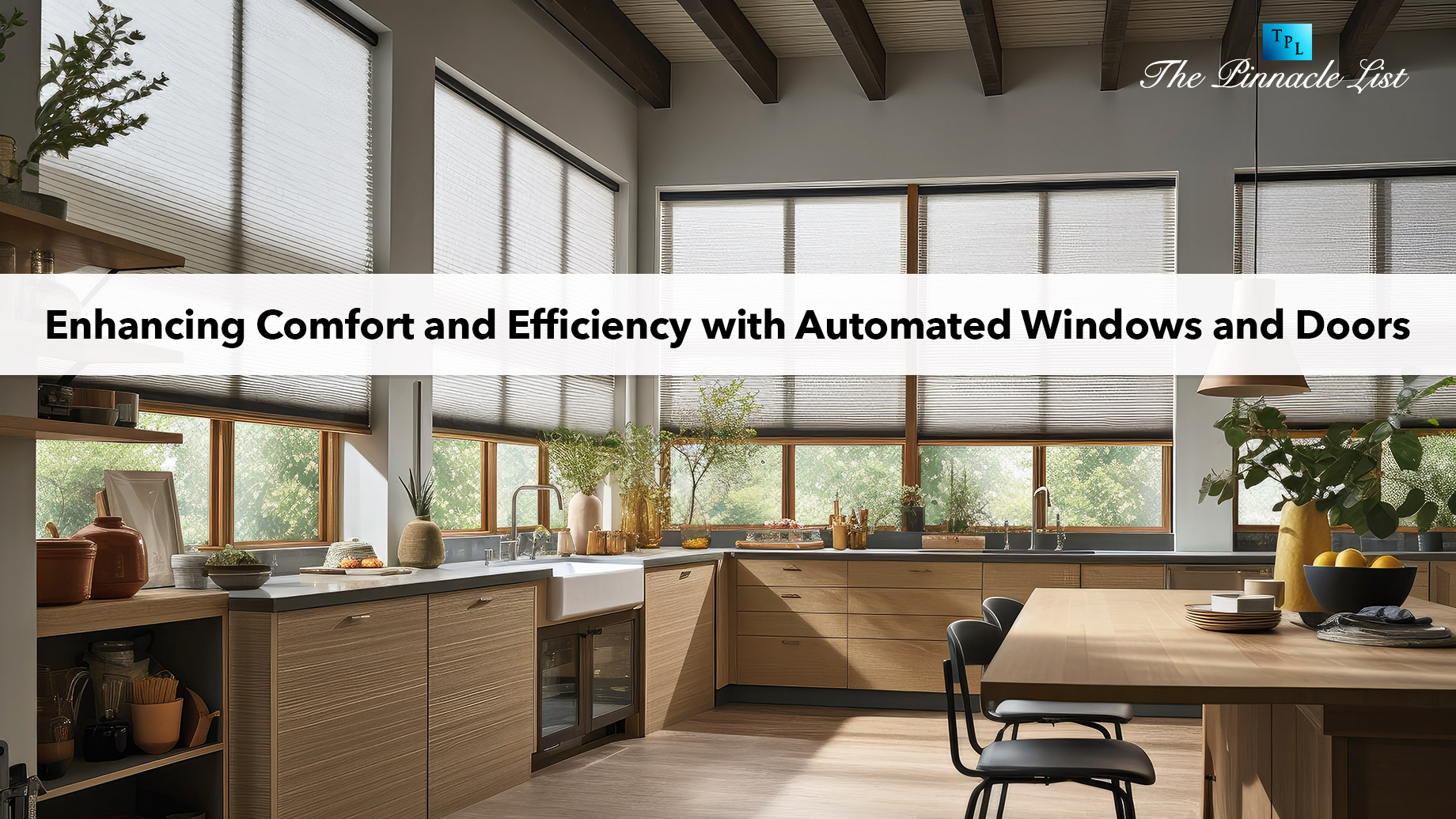
In today’s rapidly advancing technological landscape, the concept of a smart home has evolved from a futuristic dream to a practical reality. One of the key elements driving this transformation is the integration of automated windows and doors. These innovations enhance convenience and significantly improve energy efficiency and home security. This comprehensive guide will explore how automated windows and doors can revolutionize your living space, offering comfort, efficiency, and peace of mind.
Understanding Automated Windows and Doors
Automated windows and doors utilize advanced technology to offer functionalities beyond traditional manual counterparts. These systems have sensors, actuators, and connectivity features that enable remote operation and automation. Whether adjusting window blinds to control natural light or locking doors securely with a smartphone, automation brings homeowners a new level of convenience.
Benefits of Automated Windows and Doors
The benefits of integrating automated windows and doors into your smart home are manifold:
- Convenience and Ease of Use: Automated systems allow for effortless control over windows and doors. Using a centralized smart home app or voice commands with platforms like Alexa or Google Assistant, homeowners can open or close windows, adjust blinds, and lock doors from anywhere.
- Enhanced Home Security: Smart locks integrated into automated doors offer superior security features. Keyless entry systems can be managed remotely, giving homeowners peace of mind knowing their homes are secure. Additionally, sensors can detect unauthorized entry attempts and trigger alarms.
- Energy Efficiency Gains: Automated windows save energy by optimizing natural light and ventilation. Motorized blinds can adjust automatically based on sunlight intensity, reducing the need for artificial lighting and cooling. This lowers energy bills and reduces the home’s carbon footprint.
Key Features and Technologies
To understand how automated windows and doors function within a smart home ecosystem, it’s essential to grasp the core technologies involved:
- Sensors: Sensors detect changes in environmental conditions such as light levels, temperature, and humidity. This data informs automated actions like adjusting blinds or activating ventilation systems based on real-time needs.
- Connectivity: Integration with Wi-Fi or Zigbee allows automated windows and doors to communicate with other smart devices in the home. This connectivity enables seamless operation through a smartphone app or voice commands via virtual assistants.
- Remote Access and Scheduling: Remote access capabilities enable homeowners to monitor and control windows and doors from anywhere with an internet connection. Scheduling features allow for automated routines, such as closing blinds at sunset or locking doors at bedtime.
Enhancing Comfort with Automated Windows
Automated windows enhance comfort in various ways:
- Natural Light Optimization: Motorized blinds adjust throughout the day to maximize natural light while minimizing glare. This improves indoor lighting conditions and reduces the need for artificial lighting, creating a more comfortable living environment.
- Climate Control: Automated windows can integrate with HVAC systems to optimize temperature regulation. Homeowners can maintain a comfortable indoor climate by opening windows during more excellent hours and closing them during hot periods.
- Privacy and Aesthetics: Automated window treatments offer customizable privacy options. Adjusting blinds or shades can provide privacy without sacrificing natural light or aesthetic appeal, whether for bedrooms or living areas.
Improving Efficiency with Automated Doors
Automated doors contribute significantly to home efficiency:
- Enhanced Security Features: Smart locks provide advanced security features, including keyless entry and remote monitoring. Homeowners can grant access to visitors remotely and receive alerts for suspicious activity, bolstering overall home security.
- Convenience in Access: Keyless entry options eliminate the need for physical keys, offering convenience and flexibility for household members. Authorized individuals can quickly enter the home using personalized access codes or smartphone apps.
- Integration with Security Systems: Automated doors can integrate seamlessly with home security systems. In an emergency, such as a break-in attempt, automated alerts and responses can be triggered to notify homeowners and authorities promptly.
Case Studies and Real-world Applications
Real-life examples illustrate the practical benefits of automated windows and doors:
- Energy Savings Case Study: Homeowners integrate automated blinds with their smart home system. By optimizing natural light and adjusting blinds automatically, they reduce energy consumption by 20% annually, translating into significant cost savings.
- Security Enhancement Case Study: A family installs smart locks on their doors, allowing them to monitor access remotely. When travelling, they receive alerts and can grant temporary access to trusted individuals, ensuring their homes remain secure.
Considerations Before Installing Automated Systems
Before adopting automated windows and doors, homeowners should consider:
- Initial Investment: Automated systems may require upfront investment for equipment and installation. However, long-term energy savings and enhanced security justify the initial costs.
- Compatibility with Existing Infrastructure: Ensure compatibility with smart home devices and Wi-Fi networks to maximize functionality and integration capabilities.
- Choosing Reliable Products and Providers: Select reputable vendors offering reliable products and excellent customer support. Research product reviews and seek recommendations from trusted sources.
Future Trends in Smart Home Integration
Looking ahead, the future of automated windows and doors is promising:
- Advancements in Sensor Technology: Continued advancements in sensor technology will enhance accuracy and responsiveness, further optimizing energy efficiency and comfort levels.
- Integration with AI and Machine Learning: AI-powered systems will enable automated windows and doors to learn homeowner preferences and adapt operations accordingly, maximizing efficiency and convenience.
- Expansion of Smart Home Ecosystems: The expansion of smart home ecosystems will increase interoperability among devices, offering homeowners greater flexibility and customization options.
Conclusion
Integrating automated windows and doors into your smart home can significantly enhance comfort, efficiency, and security. Whether optimizing natural light, improving climate control, or bolstering home security, automation offers practical benefits that will enhance quality of life. As technology evolves, the future promises even more innovations to enrich the smart home experience. Consider partnering with a reputable Windows & Doors Manufacturer to explore how these advancements can transform your living space.